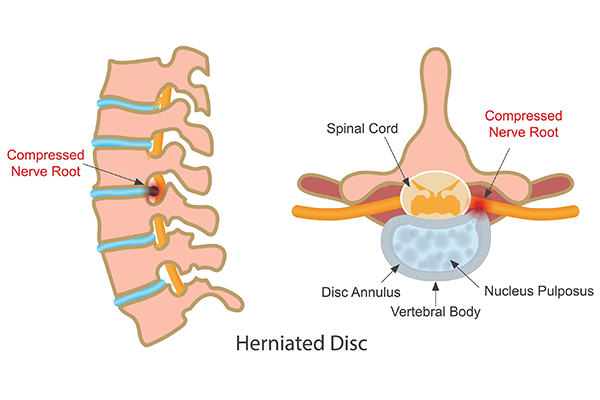
A slipped or herniated disk can be incredibly painful and disruptive to your daily life. This condition occurs when the soft, gel-like centre of a spinal disk pushes through a crack in its tougher outer layer, often leading to nerve compression. While severe cases may require medical intervention, many people can manage their symptoms at home with natural remedies. Here, we share nine effective tips to help you ease slip disk pain naturally.

Synopsis
Understanding Slip Disks
Before diving into the remedies, it’s essential to understand what a slipped disk is. The spine is made up of bones (vertebrae) cushioned by disks that act as shock absorbers. When these disks become damaged due to aging, injury, or excessive strain, the inner gel may protrude, causing nerve irritation, inflammation, and severe pain. Common symptoms include back pain, numbness, tingling, muscle weakness, and reduced mobility.
1. Stay Active (But Gently)
-
While rest is essential in the initial stages, prolonged inactivity can weaken your back muscles, making the pain worse in the long run.
-
Gentle exercises like walking, swimming, or yoga can help strengthen your core and improve spinal stability.
-
Focus on low-impact activities that don’t put excessive pressure on your spine.
2. Use Hot and Cold Therapy
-
Applying heat can help relax tight muscles and improve blood flow.
-
Cold packs can reduce inflammation and numb the affected area.
-
Use an ice pack for 15-20 minutes every hour for the first 48 hours, then switch to heat therapy as needed.
3. Correct Your Posture
-
Poor posture can exacerbate slip disk symptoms.
-
Ensure your spine is properly aligned when sitting, standing, or lifting objects.
-
Use ergonomic chairs or cushions if you have a desk job, and avoid slouching or leaning forward for long periods.
More Reads: Common Spine Disorders: Causes, Symptoms, and Treatment.
4. Try Physical Therapy
-
A physical therapist can guide you through exercises designed to strengthen your back and core muscles.
-
They can also teach you proper lifting techniques and posture corrections to prevent future injuries.
5. Stay Hydrated
-
Disks in your spine are made up of about 80% water.
-
Staying hydrated helps keep these disks flexible and resilient, reducing the risk of further damage.
6. Include Anti-Inflammatory Foods
-
A diet rich in anti-inflammatory foods like turmeric, ginger, leafy greens, nuts, and fatty fish can help reduce inflammation around the affected disk.
-
Omega-3 fatty acids, in particular, are known for their potent anti-inflammatory properties.
More Reads: Spinal Stenosis: Causes, Symptoms, & Treatments
7. Use Herbal Pain Relievers
-
Natural supplements like turmeric, boswellia, and white willow bark have been traditionally used to reduce inflammation and relieve pain.
-
However, consult a healthcare professional before starting any new supplements.
8. Practice Mind-Body Therapies
-
Stress can worsen chronic pain.
-
Techniques like deep breathing, meditation, or mindfulness can help reduce stress and promote relaxation, easing muscle tension around the spine.
9. Maintain a Healthy Weight
Excess weight can put additional strain on your spine, increasing the risk of disk problems.
Focus on maintaining a healthy diet and regular exercise to keep your weight in check.
More Reads: Degenerative Disc Disease: Causes, Symptoms, and Treatments
Tips for Managing Slip Disk Pain at Home
|
Tip |
Description |
|
Stay Active |
Engage in gentle exercises like walking or swimming. |
|
Use Hot and Cold Therapy |
Alternate heat and cold packs for pain relief. |
|
Maintain Good Posture |
Use ergonomic support and avoid slouching. |
|
Stay Hydrated |
Keep your disks healthy by drinking plenty of water. |
|
Practise Mindfulness |
Manage stress to reduce muscle tension. |
When to Seek Medical Help
While these natural remedies can significantly improve your symptoms, it’s essential to seek professional help if you experience severe or worsening pain, loss of bowel or bladder control, or weakness in your legs. These may be signs of more serious nerve damage.
Conclusion
At Manipal Hospitals Patiala, we offer comprehensive spine care, including accurate diagnosis, personalised treatment plans, and advanced surgical options for slip disks. Our expert orthopaedic and neurosurgical teams use the latest technology to ensure the best possible outcomes for our patients. Visit your nearest Manipal Hospital today to consult with a spine specialist and get back to a pain-free life. Book an Appointment Now!
FAQ's
In many cases, a slipped disk can heal on its own with proper care, including rest, physical therapy, and lifestyle adjustments. However, severe cases may require medical intervention.
Recovery time varies but can range from a few weeks to several months, depending on the severity and treatment plan.
Avoid heavy lifting, high-impact exercises, prolonged sitting, and poor posture to prevent further damage.
Yes, avoid exercises that put excessive strain on your back, like heavy weightlifting, high-impact sports, and intense core workouts.
Seek medical help if you experience severe pain, loss of bowel or bladder control, or weakness in your legs, as these may indicate nerve damage.





















 4 Min Read
4 Min Read

















